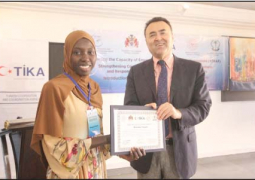More than ninety farmers were recently trained on Alternative Feed Sources preservation and conservation production by the Department of Agriculture.
The participants were drawn from Nianija in the Central River Region north, Niamina East in the Central River Region south and Kiang West in the Lower River Region.
The three-day training implemented by the Department of Agriculture was funded by PROGEBBE- Gambia National coordinating unit.
Speaking on the occasion, Emmanuel W. Mendy, project focal officer at the Department of Agriculture, told the farmers that the Department of Agriculture, which includes veterinary services, is the technical arm of government which has the recognition and expertise in the management of natural resources, especially pertaining to crop, livestock and soil.
Mr Mendy further asserted that based on this role, the Department of Agriculture signed a memorandum of agreement with the Gambia National Coordination unit - PROGEBBE-Gambia - of the Regional project for the sustainable management of endemic ruminant livestock of West Africa, to among other things foster institutional collaboration in the implementation of the project’s specific components pertaining to genetic conservation of the indigenous livestock breeds and the management of their habitat and resources.
The farmers training on feed resources production is one of the activities funded by PROGEBBE-Gambia National coordinating unit and implemented by the Department of Agriculture.
According to him, the overview of PROGEBBE is designed to enhance conservation of biodiversity of endemic ruminant livestock, their unique genetic traits and habitats and to improve their productivity with a view to strengthen food security and poverty alleviation.
Mr Mendy further stressed that the overall objectives of the training was to develop and implement approaches to community-based conservation and management of the environment through the use of modern techniques and management skills to preserve feed resources, its conservation and usage for the feeding of the endemic ruminant livestock.
He therefore used the opportunity to call on the participants to take the training seriously and disseminate the information to their communities.
For his part, Sarjo Marena, National Expert for Finance and Administration of PROGEBBE, deputizing for the coordinator of PROGEBBE, called on the participants to effectively utilise in their respective areas the training manual provided by the resource persons.
It is very user-friendly in that it has both script and pictorial guides to serve as reference materials at their home level to back up their effort in the adoption of the conservation and preservation techniques learnt during the training, Mr Marena says.




